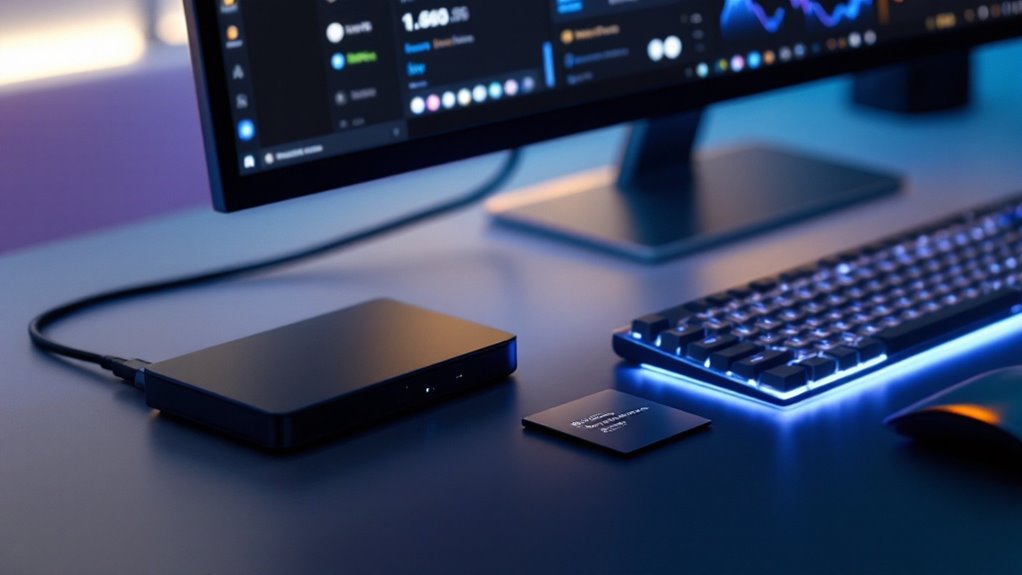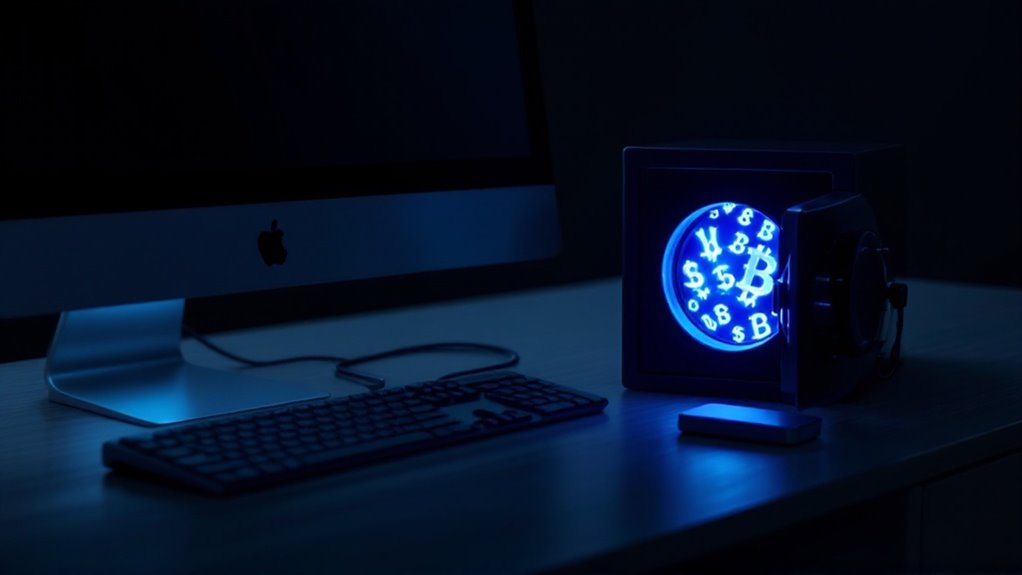Desktop cryptocurrency wallets serve as digital vaults installed directly on personal computers, offering users complete control over their private keys and assets. These non-custodial solutions strike a careful balance between security and accessibility, employing robust encryption and two-factor authentication while remaining vulnerable to sophisticated malware. Like a middle-class neighborhood in the crypto storage landscape, desktop wallets provide more protection than web-based options but less than hardware alternatives. The journey to understanding their full potential unfolds through layers of strategic implementation.

In the world of cryptocurrency, desktop wallets serve as digital vaults that transform ordinary computers into secure fortresses for managing digital assets. These software applications, installed directly on personal computers, offer users a robust combination of security features and convenient functionality that bridges the gap between accessibility and protection. The non-custodial nature of these wallets ensures users maintain complete control over their private keys and assets.
Like a traditional bank vault with multiple layers of security, desktop wallets employ sophisticated encryption algorithms and two-factor authentication to guard their digital treasures. The software creates a secure environment where users can store private keys, manage multiple cryptocurrencies, and execute transactions with confidence. Popular options like Exodus and Electrum have become trusted companions for crypto enthusiasts, each offering its own blend of features and security measures. The integration of real-time monitoring helps detect and prevent suspicious activities before they become threats. Most modern desktop wallets include seed phrase backup functionality to ensure users can recover their funds if their device fails or is lost.
Desktop wallets fortify digital assets through encryption and authentication, creating a secure vault for cryptocurrency management and transactions.
However, desktop wallets aren't impervious to threats. Just as a physical safe can be compromised by determined thieves, these digital strongholds face risks from malware, keyloggers, and increasingly clever phishing attempts. The irony isn't lost on users who must protect their virtual wealth from very real dangers lurking in the digital shadows. Smart investors treat their desktop wallets like valuable antiques: with careful handling and regular maintenance.
When compared to other storage solutions, desktop wallets strike a delicate balance between security and convenience. They offer more protection than web-based alternatives but can't quite match the fort-knox-level security of hardware wallets. Think of them as the middle-class neighborhood of the crypto world: safer than the bustling downtown of exchange wallets but not quite as secure as the gated community of cold storage solutions.
To maximize protection, users must follow essential best practices that feel like a digital version of home security: strong passwords serve as deadbolts, regular backups act as insurance policies, and automatic updates patch potential vulnerabilities.
Frequently Asked Questions
Can Desktop Crypto Wallets Be Accessed From Multiple Computers Simultaneously?
Most crypto wallets can be accessed from multiple computers simultaneously through backup methods, cloud syncing, or recovery phrases. However, this increases security risks, so limiting device access is recommended for safety.
What Happens to My Crypto if My Computer Crashes or Gets Stolen?
If proper backups exist through seed phrases or encrypted copies, crypto remains accessible after computer issues. Without backups, a crash or theft could result in permanent loss of digital assets.
Do Desktop Wallets Require Regular Software Updates to Remain Secure?
Regular software updates are essential for wallet security, addressing vulnerabilities, patching security flaws, and maintaining compatibility with blockchain networks. Without updates, wallets become susceptible to cyber threats and potential breaches.
Can I Recover My Wallet if I Forget My Password?
Recovering a forgotten wallet password depends on the recovery method available. The seed phrase is the most reliable option, while some wallets offer password resets. Professional recovery services can help as a last resort.
Are Desktop Wallets Compatible With All Types of Cryptocurrencies?
While most desktop wallets support major cryptocurrencies like Bitcoin and Ethereum, they don't support all types. Each wallet has specific compatibility limitations, though multi-currency wallets can support over 100 different cryptocurrencies.









